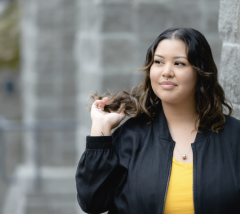The Youth Justice program prepares students to work alongside young people who face multiple vulnerabilities. Through a combination of Criminology and Child and Youth Care courses that blend theory and practice, you will learn how to be attentive and responsive to the unique needs of young people and to reflect on your relational practice to continually develop as a youth worker. Youth workers engage with young people in a variety of contexts – schools, community centres, custody centres, residential services, mentorship programs, social service agencies – to support varied and often intersecting challenges – mental health, trauma, substance use, criminal justice involvement, being unhoused or transient, and limited connection to positive, stable supports – in a holistic way. We critically examine how historical, social, cultural, political, and economic systems shape the development of young people in families and communities.
Program highlights
Unique program
Unique in British Columbia, Douglas College’s two-year Youth Justice program blends Criminology and Child and Youth Care theory and practice, and provides practical experience in youth-focused settings
Hands-on experience
You’ll put what you learn in the classroom into practice through two practicum placements at social-service and other agencies, where you’ll also develop your understanding of the roles professionals play in real-world settings.
Our mission is to develop reflective, ethical, and effective youth justice workers, who are empathic, self-aware, relational, and demonstrate strong critical thinking skills to navigate the complex and dynamic responsibilities of youth work.
The Youth Justice diploma prepares students to work in the field of youth justice and/or to continue with related educational opportunities (e.g., Bachelor of Arts degrees in Criminology or Child and Youth Care, Bachelor of Social Work degree). Upon successful completion of the program, our students should be able to:
- Illustrate self-awareness and apply personal and professional values to ethical and effective practice.
- Use developing literacies (reading, writing, disciplinary, digital) appropriately in practice.
- Demonstrate interpersonal relational skills, sensitivity, and openness to the experiences and perspectives of others.
- Apply critical thinking skills to allow for purposeful and intentional practice in novel and complex situations.
- Actively integrate learning into practice and demonstrate curiosity and commitment to ongoing learning and development.
Demand for grads with a credential in youth justice studies is high. Once you graduate, you can expect to find employment in social-service, government, health, school and justice-system settings.
Advancement opportunities
If you want to complete a bachelor’s degree, the diploma will allow you to enter the third year of Royal Roads University’s Bachelor of Arts in Justice Studies program or Douglas College’s Bachelor of Arts in Child and Youth Care, or the second year of Douglas’s Bachelor of Social Work. You can also complete additional courses to enter into Douglas College's Bachelor of Applied Criminology.
We recommend that students applying for fall intake submit their applications and accompanying documentation as early as possible for consideration; our first review of applications occurs in January.
Want to join us this fall?
- Please use the link above to apply to the college. If you are an Indigenous student, your application fee may be waived. Please email indigenousrecruiter@douglascollege.ca to receive your waiver code. When you apply, you will be able to specify that you are interested in the Youth Justice program.
- When your application is received, the College will request documentation to ensure you meet the college's English proficiency requirements
- If you meet the English requirement, then we will ask you to join us for an admissions event
- Here you will meet other prospective students, learn about the program, and engage in some activities and discussion to determine your eligibility for the program.
- We ask that you submit two online reference forms
- We will also ask you to complete some work for this event - including an essay explaining your interest in the program, and some problem-solving activities.
- If you are determined ready to join the cohort, we will offer you a seat for the fall and you will confirm your seat with:
- A tuition deposit
- A Ministry criminal record check (information will be provided to you) before you begin the program
Then we enthusiastically welcome you and your cohort to the program in September!

